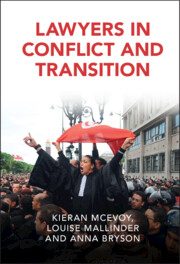Refine search
Actions for selected content:
3 results

Lawyers in Conflict and Transition
-
- Published online:
- 17 March 2022
- Print publication:
- 17 March 2022
Chapter 1 - Lawyers in Conflict and Transition
-
- Book:
- Lawyers in Conflict and Transition
- Published online:
- 17 March 2022
- Print publication:
- 17 March 2022, pp 1-21
-
- Chapter
- Export citation
4 - Trust, Autonomy and the Fiduciary Relationship
- from Part I - Personal Trust and Fiduciary Relationships
-
-
- Book:
- Fiduciaries and Trust
- Published online:
- 13 March 2020
- Print publication:
- 02 April 2020, pp 74-86
-
- Chapter
- Export citation
